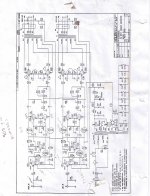I have an El34 PP amp that I've had problems with since I got it. It always takes takes out one EL34. Always the same one. I replaced everything hooked to that tube and everything in the neg bias circuit for all output tubes. The only thing not replaced is iron and it continued to oscillate. The oscillation started on the cathode of the signal splitter. I finally traced it to the feedback loop which is hooked up to cathode of the previous input tube. When the feedback is unhooked it quits. The feedback loop is hooked to the 16 ohm speaker tap. The thing is when I hook the feedback to the 8 or 4 ohm tap it does not oscillate. The other side is wired exactly the same and no problems. Anyone explain this to me.
The 16 ohm tap has higher output voltage than the other two, so hooking the feedback to that tap gives the most feedback and least stability. Can't you just leave the feedback hooked to the 8 ohm tap on both channels? It's only 3dB difference.
Yes, I can and was going to do that. I was just wondering why this happened. I don't know much about PP and feedback. Just trying to learn. It does not affect the other channel but will also change it.
I suspect this is why the amp was sold. I doesn't happen regularly. It can go for months with no problem. I just figured I better find the problem when I suddenly lost three tubes in three nights.
I suspect this is why the amp was sold. I doesn't happen regularly. It can go for months with no problem. I just figured I better find the problem when I suddenly lost three tubes in three nights.
Got a circuit diagram ?
Sounds like a case of high gm tubes missing g2 anode snubbers. Most global feedback amps cheer up when feedback loop is disconnected; why ? The open loop gain can tailor off at-will but the response, thd+ noise+ damping factors will be miserable..
The reason why it doesn't effect the other channel, is often a case of luck due to slight variations of output transformer characteristics.
Beware of scope probes; the inherent probe capacitance can stop a circuit oscillating.
Godfrey mentions using other o/p tranny taps: this can have a profound effect on the upper audio response; the same effect as an over-compensated front end stage phase compensation.
richy
Sounds like a case of high gm tubes missing g2 anode snubbers. Most global feedback amps cheer up when feedback loop is disconnected; why ? The open loop gain can tailor off at-will but the response, thd+ noise+ damping factors will be miserable..
The reason why it doesn't effect the other channel, is often a case of luck due to slight variations of output transformer characteristics.
Beware of scope probes; the inherent probe capacitance can stop a circuit oscillating.
Godfrey mentions using other o/p tranny taps: this can have a profound effect on the upper audio response; the same effect as an over-compensated front end stage phase compensation.
richy
If you have an oscilloscope, check that your feedback is NFB, not PFB. Several people have posted similar problems and had their output transformer hooked up backwards resulting in PFB. This can happen if the plates of the tubes are reversed with respect to the output transformer.
I ran across that post and checked it but, if the transformer was hooked up backwards would that not throw off the speaker phase and cause oscillation on all taps? I might add this oscillation happens without any input signal.
- Status
- Not open for further replies.
- Home
- Amplifiers
- Tubes / Valves
- PP oscillation problem
